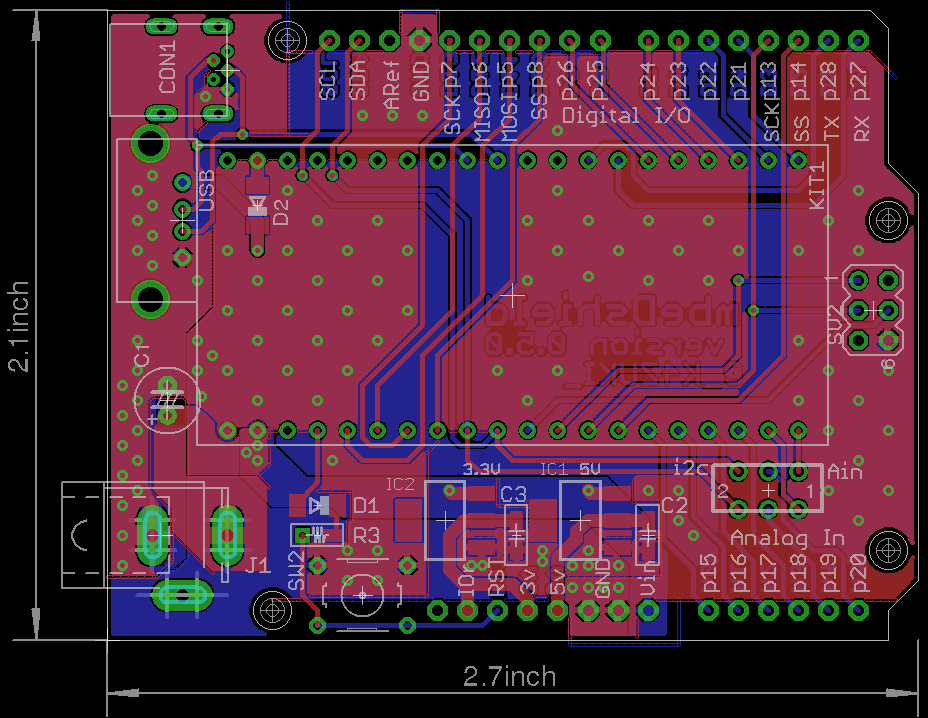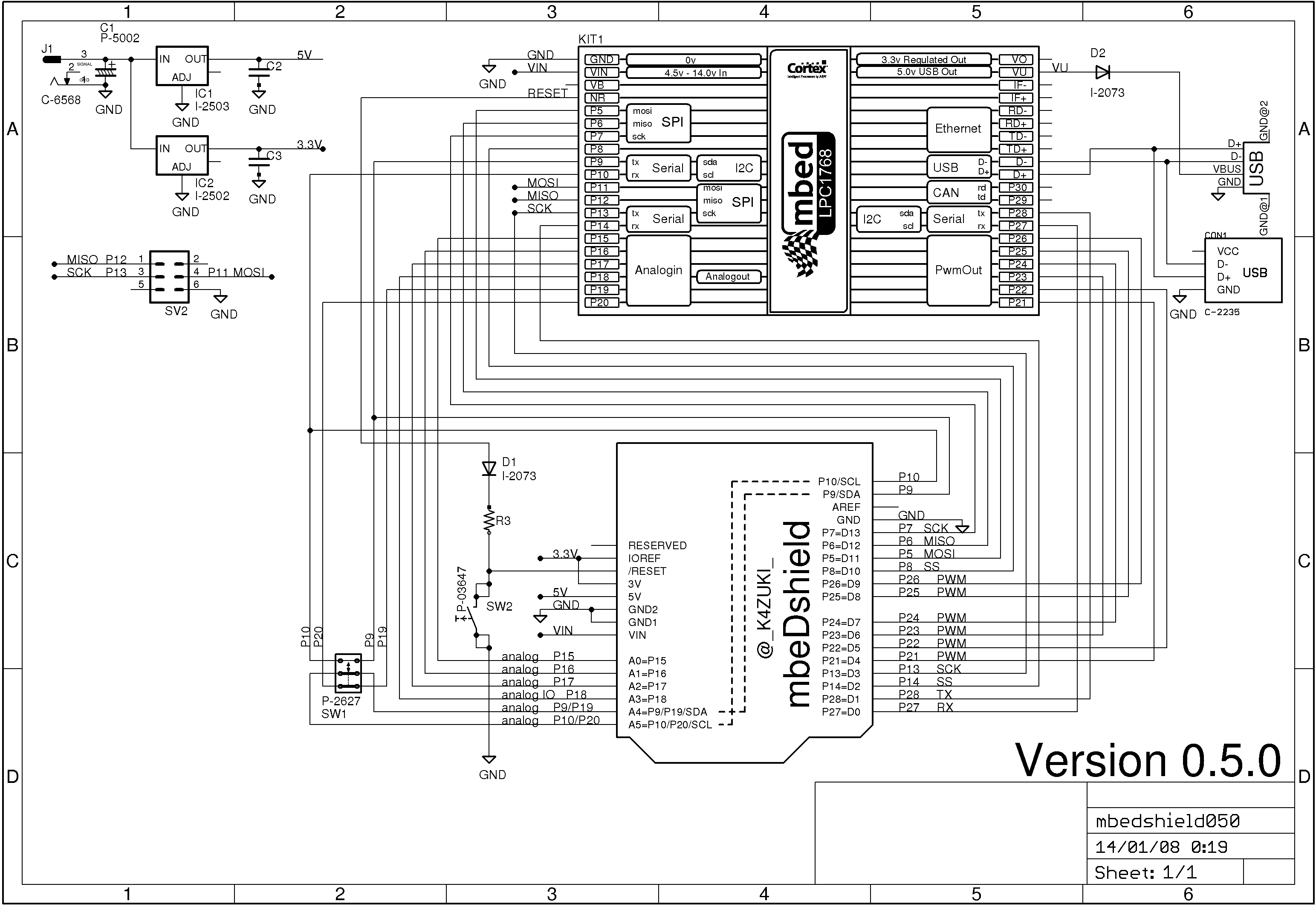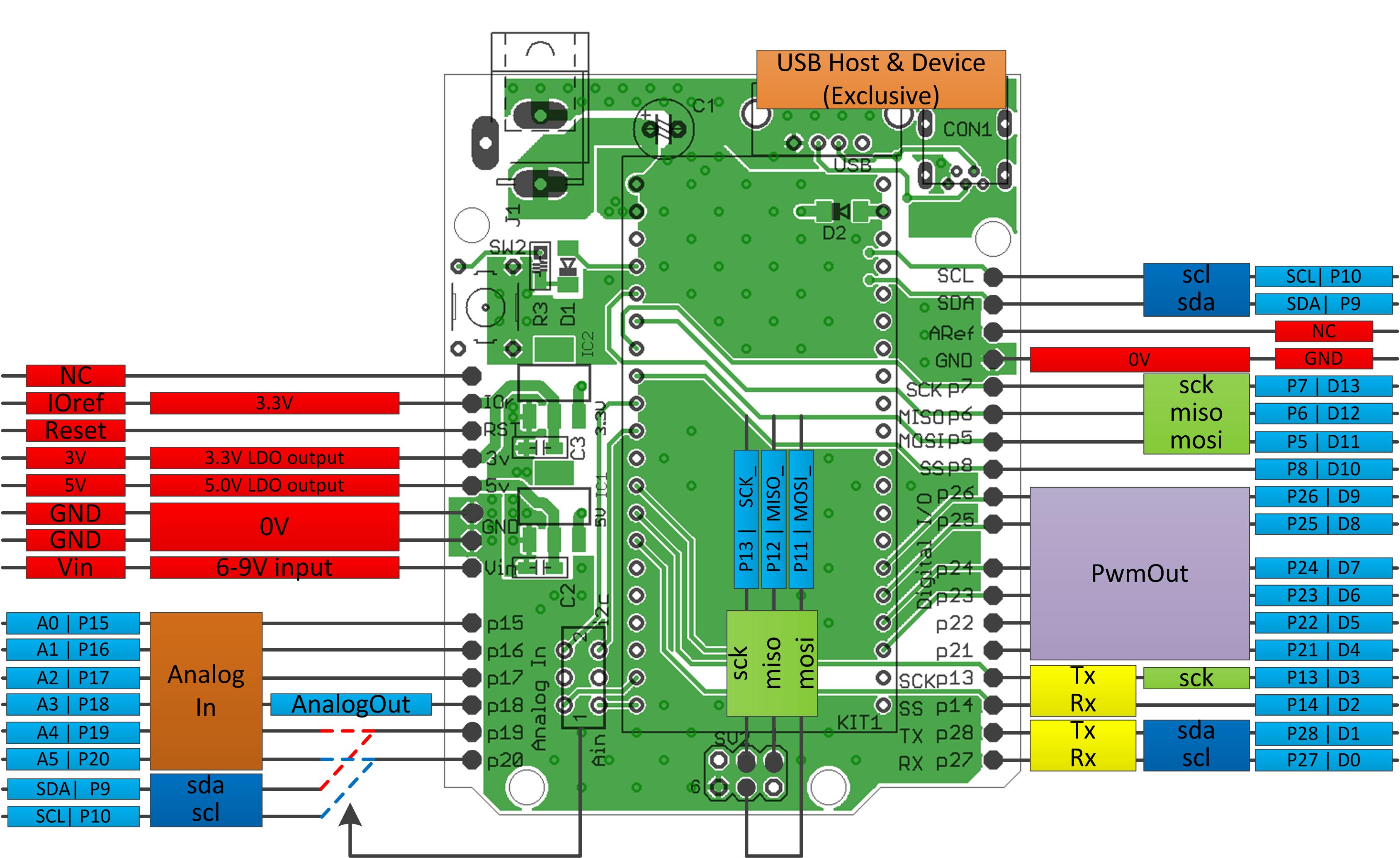The official mbed C/C SDK provides the software platform and libraries to build your applications.
Fork of mbed by
(01.May.2014) started sales! http://www.switch-science.com/catalog/1717/
(13.March.2014) updated to 0.5.0
This is a pin conversion PCB from mbed 1768/11U24 to arduino UNO.
- So if you have both mbed and arduino shields, I guess you would be happy with such a conversion board :)
Photos
- Board photo vvv

- Schematic photo vvv

- Functionality photo vvv

Latest eagle files
PCB >> /media/uploads/k4zuki/mbedshield050.brd
SCH >> /media/uploads/k4zuki/mbedshield050.sch
BIG changes from previous version
- Ethernet RJ45 connector is removed.
- http://mbed.org/components/Seeed-Ethernet-Shield-V20/ is the biggest hint to use Ethernet!
MostALL of components can be bought at Akizuki http://akizukidenshi.com/- But sorry, they do not send parts to abroad
- Pinout is changed!
| arduino | 0.4.0 | 0.5.0 |
|---|---|---|
| D4 | p12 | p21 |
| D5 | p11 | p22 |
| MOSI_ | none | p11 |
| MISO_ | none | p12 |
| SCK_ | none | p13 |
This design has bug(s)
- I2C functional pin differs between 1768 and 11U24.
Fixed bugs here
- MiniUSB cable cannot be connected on mbed if you solder high-height electrolytic capacitor on C3.
- http://akizukidenshi.com/catalog/g/gP-05002/ is the solution to make this 100% AKIZUKI parts!
- the 6-pin ISP port is not inprimented in version 0.4.0
it will be fixed in later version 0.4.1/0.4.2/0.5.0This has beenfixed
I am doing some porting to use existing arduino shields but it may faster if you do it by yourself...
you can use arduino PinName "A0-A5,D0-D13" plus backside SPI port for easier porting.
To do this you have to edit PinName enum in
- "mbed/TARGET_LPC1768/PinNames.h" or
- "mbed/TARGET_LPC11U24/PinNames.h" as per your target mbed.
here is the actual list: This list includes define switch to switch pin assignment
part_of_PinNames.h
USBTX = P0_2,
USBRX = P0_3,
//from here mbeDshield mod
D0=p27,
D1=p28,
D2=p14,
D3=p13,
#ifdef MBEDSHIELD_050
MOSI_=p11,
MISO_=p12,
SCK_=p13,
D4=p21,
D5=p22,
#else
D4=p12,
D5=p11,
#endif
D6=p23,
D7=p24,
D8=p25,
D9=p26,
D10=p8,
D11=p5,
D12=p6,
D13=p7,
A0=p15,
A1=p16,
A2=p17,
A3=p18,
A4=p19,
A5=p20,
SDA=p9,
SCL=p10,
//mbeDshield mod ends here
// Not connected
NC = (int)0xFFFFFFFF
Diff: FileHandle.h
- Revision:
- 0:82220227f4fa
- Child:
- 1:6b7f447ca868
--- /dev/null Thu Jan 01 00:00:00 1970 +0000
+++ b/FileHandle.h Tue Apr 08 14:12:21 2008 +0000
@@ -0,0 +1,95 @@
+/* mbed Microcontroller Library - FileHandle
+ * Copyright (c) 2007-2008, sford
+ */
+
+#ifndef MBED_FILEHANDLE_H
+#define MBED_FILEHANDLE_H
+
+namespace mbed {
+
+/* Class: FileHandle
+ * An OO equivalent of the internal FILEHANDLE variable
+ * and associated _sys_* functions
+ *
+ * FileHandle is an abstract class, needing at least sys_write and
+ * sys_read to be implmented for a simple interactive device
+ *
+ * No one ever directly tals to/instanciates a FileHandle - it gets
+ * created by FileSystem, and wrapped up by stdio
+ */
+class FileHandle {
+
+public:
+
+ //virtual ~FileHandle() { }
+
+ /* Function: sys_write
+ * Write the contents of a buffer to the file
+ *
+ * Parameters:
+ * buffer - the buffer to write from
+ * length - the number of characters to write
+ * mode - the mode of the file, 0 (normal) or 1 (binary); this may be unused?
+ *
+ * Returns:
+ * 0 on success, -1 on error, or the number of characters not written on partial success
+ */
+ virtual int sys_write(const unsigned char* buffer, unsigned int length, int mode) = 0;
+
+ virtual int sys_close() = 0;
+
+ /* Function: sys_read
+ * Reads the contents of the file into a buffer
+ *
+ * Parameters:
+ * buffer - the buffer to read in to
+ * length - the number of characters to read
+ * mode - the mode of the file, 0 (normal) or 1 (binary); this may be unused?
+ *
+ * Returns:
+ * 0 on success, -1 on error, or the number of characters not read on partial success. EOF is
+ * signaled by setting the top bit (0x80000000) of the return value.
+ */
+ virtual int sys_read(unsigned char* buffer, unsigned int length, int mode) = 0;
+
+ /* Function: sys_istty
+ * Check if the handle is for a interactive terminal device
+ *
+ * If so, unbuffered behaviour is used by default
+ *
+ * Returns:
+ * 0 - no
+ * 1 - yes
+ */
+ virtual int sys_istty() = 0 ;
+
+ /* Function: sys_seek
+ * Move the file position to a given offset from the file start
+ *
+ * Returns:
+ * 0 on success, -1 on failure or unsupported
+ */
+ virtual int sys_seek(int position) = 0;
+
+ /* Function: sys_ensure
+ * Flush any OS buffers associated with the FileHandle, ensuring it
+ * is up to date on disk
+ *
+ * Returns:
+ * 0 on success or un-needed, -1 on error
+ */
+ virtual int sys_ensure() = 0;
+
+ /* Function: sys_flen
+ * Find the current length of the file
+ *
+ * Returns:
+ * The current length of the file, or -1 on error
+ */
+ virtual int sys_flen() = 0;
+
+};
+
+} // namespace mbed
+
+#endif
\ No newline at end of file
